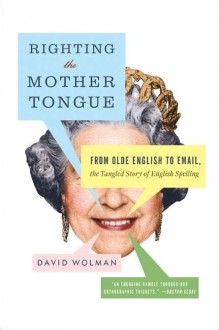Reviewed by MurderByDeath on
Reading updates
- Started reading
- 14 May, 2018: Finished reading
- 14 May, 2018: Reviewed

In Righting the Mother Tongue, author David Wolman tells the cockamamie story of English spelling, by way of a wordly adventure from English battlefields to Google headquarters. Along the way, he joins spelling reformers picketing the national spelling bee, visits the town in Belgium--not England--where the first English books were printed, and takes a road trip with the boss at Merriam-Webster Inc. Wolman punctuates the journey with spelling wars waged by the likes of Samuel Johnson, Noah Webster, Theodore Roosevelt, and Andrew Carnegie.
Rich with history, pop culture, curiosity, and humor, Righting the Mother Tongue explores how English spelling came to be, traces efforts to mend the code, and imagines the shape of tomorrow's words.